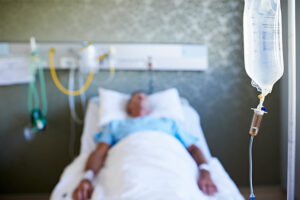Oncology
Multiple Myeloma
Novel and Emerging Therapeutic Strategies for Multiple Myeloma
Overview
Important new research on cellular and immune-based therapies for relapsed/refractory multiple myeloma was presented at the 62nd ASH Annual Meeting and Exposition. Therapeutic strategies included CD38-directed monoclonal antibodies, autologous cellular immunotherapies, bispecific antibodies, and antibody-drug conjugates.
Our featured expert, Paul G. Richardson, MD, was interviewed by Conference Reporter Editor-in-Chief Tom Iarocci, MD, and Dr Richardson’s clinical perspectives on this research are presented here.
Paul G. Richardson, MD
|
|
“The continued reporting of positive data speaks to the real promise of cellular therapy and immunotherapy, including bispecific T-cell engagers and antibody-drug conjugates.”
With the enormous challenges of the ongoing COVID-19 pandemic and all of the restrictions that it imposes, it was amazing to see the number of abstracts on novel therapies for multiple myeloma being presented this year at ASH 2020, particularly in the area of cellular therapy and bispecific T-cell engagers. The continued reporting of positive data speaks to the real promise of cellular therapy and immunotherapy, including bispecific T-cell engagers and antibody-drug conjugates.
Several B-cell maturation antigen–targeted platforms have been developed, and impressive high-quality durable responses have been seen with chimeric antigen receptor (CAR) T-cell therapies in early phase 1 and 2 trials (eg, idecabtagene vicleucel and ciltacabtagene autoleucel). Additional evaluation of safety, with special attention to cytokine release syndrome, is, of course, needed—especially in the context of COVID-19. However, the data from ASH 2020 on CAR T-cell therapy were, in aggregate, outstanding in my opinion. In the same spirit, the momentum continues to grow remarkably for bispecific T-cell engagers, and these platforms would be “off the shelf” and critically not requiring the treatment production lead time needed for CAR T-cell therapy, but they would still require inpatient admission for at least a few days. Belantamab mafodotin, an important new antibody-drug conjugate targeting B-cell maturation antigen, is, in contrast, an outpatient off-the-shelf option that was recently approved by the US Food and Drug Administration. Keratopathy is an important but manageable toxicity that requires coordination with ophthalmology.
We have also continued to see strong data in support of the oral XPO1 inhibitor selinexor in the relapsed and refractory space. The combination of selinexor with bortezomib and dexamethasone, compared with twice-weekly bortezomib and dexamethasone, achieved improved overall responses and clinically meaningful progression-free survival benefit that was highly significant. The results of a subgroup analyses from the phase 3 BOSTON study were presented in abstract 1385, showing that, despite using 40% less bortezomib and 25% less dexamethasone during the first 24 weeks of treatment, the weekly regimen of selinexor, bortezomib, and dexamethasone resulted in superior responses and progression-free survival benefit compared with twice-weekly bortezomib and dexamethasone, including in patients with high-risk cytogenetics.
Favorable data with the anti-CD38 monoclonal antibodies continue to emerge, with further reporting from the CANDOR study and the IKEMA trial being described (abstracts 2287 and 414, respectively). With the type of data that IKEMA provides and knowing that daratumumab and isatuximab bind to different epitopes on CD38, I think that there is a strong rationale for the use of isatuximab after daratumumab failure, but critically in combination with other agents that rationally achieve synergy, such as pomalidomide and carfilzomib. Encouragingly, The University of Texas MD Anderson Cancer Center group reported data from an investigator-sponsored clinical trial of isatuximab combined with pomalidomide and dexamethasone after prior daratumumab failure (abstract 1371). This was a heavily pretreated population, and, despite prior anti-CD38 therapy with daratumumab, 66% experienced a clinically beneficial response or better.
Elsewhere at ASH 2020, the investigational cereblon E3 ligase modulator iberdomide was evaluated in combination with dexamethasone and daratumumab or bortezomib in patients with relapsed and refractory multiple myeloma, as reported in abstract 724. Cereblon E3 ligase modulators are more than just a new generation of immunomodulatory drugs. While they share some features with lenalidomide and pomalidomide, they are very large molecules that engage tightly on the requisite receptor binding site in the cereblon E3 ligase complex and have a distinct pharmacologic profile. They are substantially more potent than lenalidomide or pomalidomide and, importantly, are well tolerated with the convenience of an oral administration. There are already studies underway with iberdomide to assess its use after CAR T-cell therapy as a maintenance strategy.
In the coming year, we look forward to additional data on CC-92480, the other principal cereblon E3 ligase modulator under study that is markedly more potent than iberdomide preclinically. Further, data presented at both the 2020 ASCO Virtual Scientific Program and the 24th European Hematology Association Congress suggest impressive activity in heavily pretreated patients in combination with dexamethasone as part of a phase 1 study.
Finally, what is arguably “older” is new again, with protocols investigating the use of melflufen. Alkylators have a long history of effective use in the treatment of multiple myeloma, and, while melflufen does deliver an alkylator “warhead,” it is distinct in that it is a peptide-conjugated drug with a novel aminopeptidase-potentiated delivery mechanism; this mechanism is designed to produce increased on-target cell potency and decreased off-target cell toxicity. Melflufen is remarkably active. Efficacy and safety data from the phase 1/2 ANCHOR study were reported in abstract 417, and the data were impressive. Melflufen plus dexamethasone as a triplet regimen with the approved agents bortezomib or daratumumab has encouraging activity in heavily pretreated relapsed and refractory disease. And, as we saw in abstract 3214, melflufen plus dexamethasone showed benefit even in patients with extramedullary disease, which is a great unmet need. While myelosuppression is an important toxicity, it is manageable, and rates of significant infection have been low.
References
Becnel MR, Horowitz SB, Thomas SK, et al. Descriptive analysis of isatuximab use following prior daratumumab in patients with relapsed/refractory multiple myeloma [abstract 1371]. Abstract presented at: 62nd American Society of Hematology Annual Meeting and Exposition; December 5-8, 2020.
Lonial S, Van De Donk NWCJ, Popat R, et al. First clinical (phase 1b/2a) study of iberdomide (CC-220; IBER), a CELMoD, in combination with dexamethasone (DEX) in patients (pts) with relapsed/refractory multiple myeloma (RRMM). J Clin Oncol. 2019;37(15 suppl):8006. doi:10.1200/JCO.2019.37.15_suppl.8006
Martin T, Mikhael J, Hajek R, et al. Depth of response and response kinetics of isatuximab plus carfilzomib and dexamethasone in relapsed multiple myeloma: IKEMA interim analysis [abstract 414]. Abstract presented at: 62nd American Society of Hematology Annual Meeting and Exposition; December 5-8, 2020.
Ocio EM, Efebera YA, Hájek R, et al. ANCHOR (OP-104): melflufen plus dexamethasone (dex) and daratumumab (dara) or bortezomib (BTZ) in relapsed/refractory multiple myeloma (RRMM) refractory to an IMiD and/or a proteasome inhibitor (PI) – updated efficacy and safety [abstract 417]. Abstract presented at: 62nd American Society of Hematology Annual Meeting and Exposition; December 5-8, 2020.
Richard S, Chari A, Delimpasi S, et al. Once weekly selinexor, bortezomib, and dexamethasone (SVd) versus twice weekly bortezomib and dexamethasone (Vd) in relapsed or refractory multiple myeloma: high-risk cytogenetic risk planned subgroup analyses from the phase 3 BOSTON study [abstract 1385]. Abstract presented at: 62nd American Society of Hematology Annual Meeting and Exposition; December 5-8, 2020.
Richardson PG, Mateos M-V, Oriol A, et al. HORIZON (OP-106): melflufen plus dexamethasone (dex) in 55 patients (pts) with relapsed/refractory multiple myeloma (RRMM) with extramedullary disease (EMD)—subgroup analysis [abstract 3214]. Abstract presented at: 62nd American Society of Hematology Annual Meeting and Exposition; December 5-8, 2020.
Richardson PG, Vangsted AJ, Ramasamy K, et al. First-in-human phase I study of the novel CELMoD agent CC-92480 combined with dexamethasone (DEX) in patients (pts) with relapsed/refractory multiple myeloma (RRMM). J Clin Oncol. 2020;38(15 suppl):8500. doi:10.1200/JCO.2020.38.15_suppl.8500
Van De Donk NWCJ, Popat R, Larsen J, et al. First results of iberdomide (IBER; CC-220) in combination with dexamethasone (DEX) and daratumumab (DARA) or bortezomib (BORT) in patients with relapsed/refractory multiple myeloma (RRMM) [abstract 724]. Abstract presented at: 62nd American Society of Hematology Annual Meeting and Exposition; December 5-8, 2020.
Weisel K, Geils GF, Karlin L, et al. Carfilzomib, dexamethasone, and daratumumab versus carfilzomib and dexamethasone in relapsed or refractory multiple myeloma: subgroup analysis of the phase 3 CANDOR study in patients with early or late relapse [abstract 2287]. Abstract presented at: 62nd American Society of Hematology Annual Meeting and Exposition; December 5-8, 2020.
This information is brought to you by Engage Health Media and is not sponsored, endorsed, or accredited by the American Society of Hematology.











